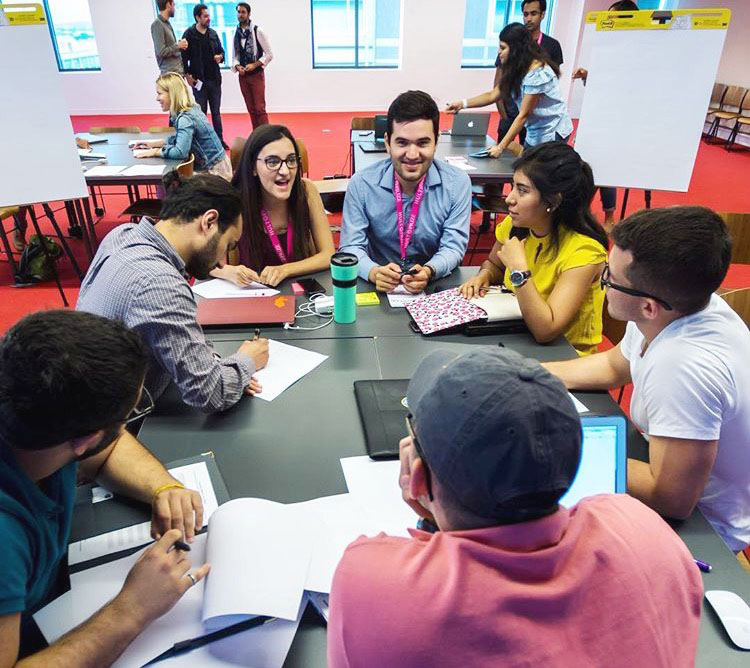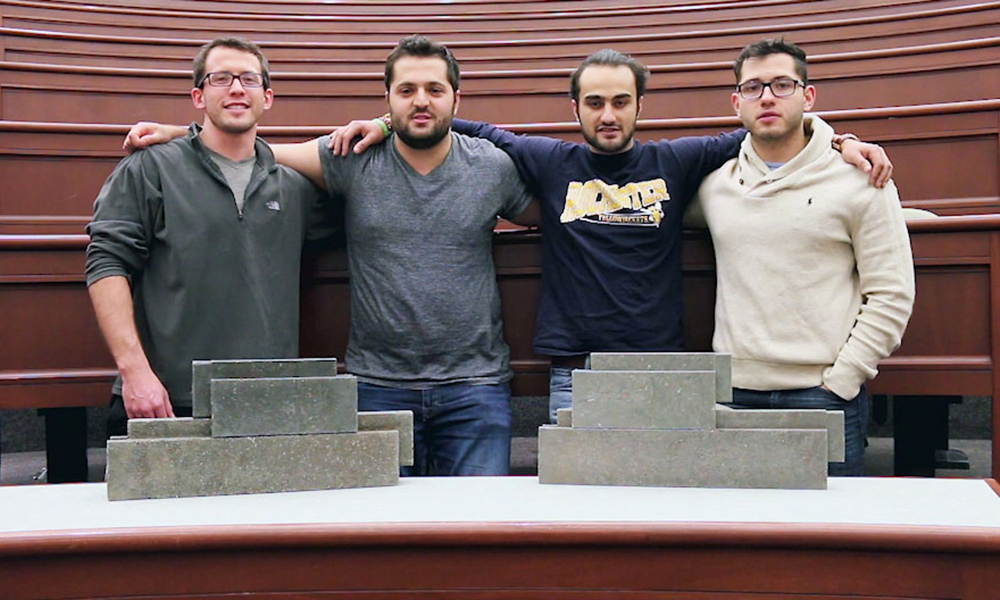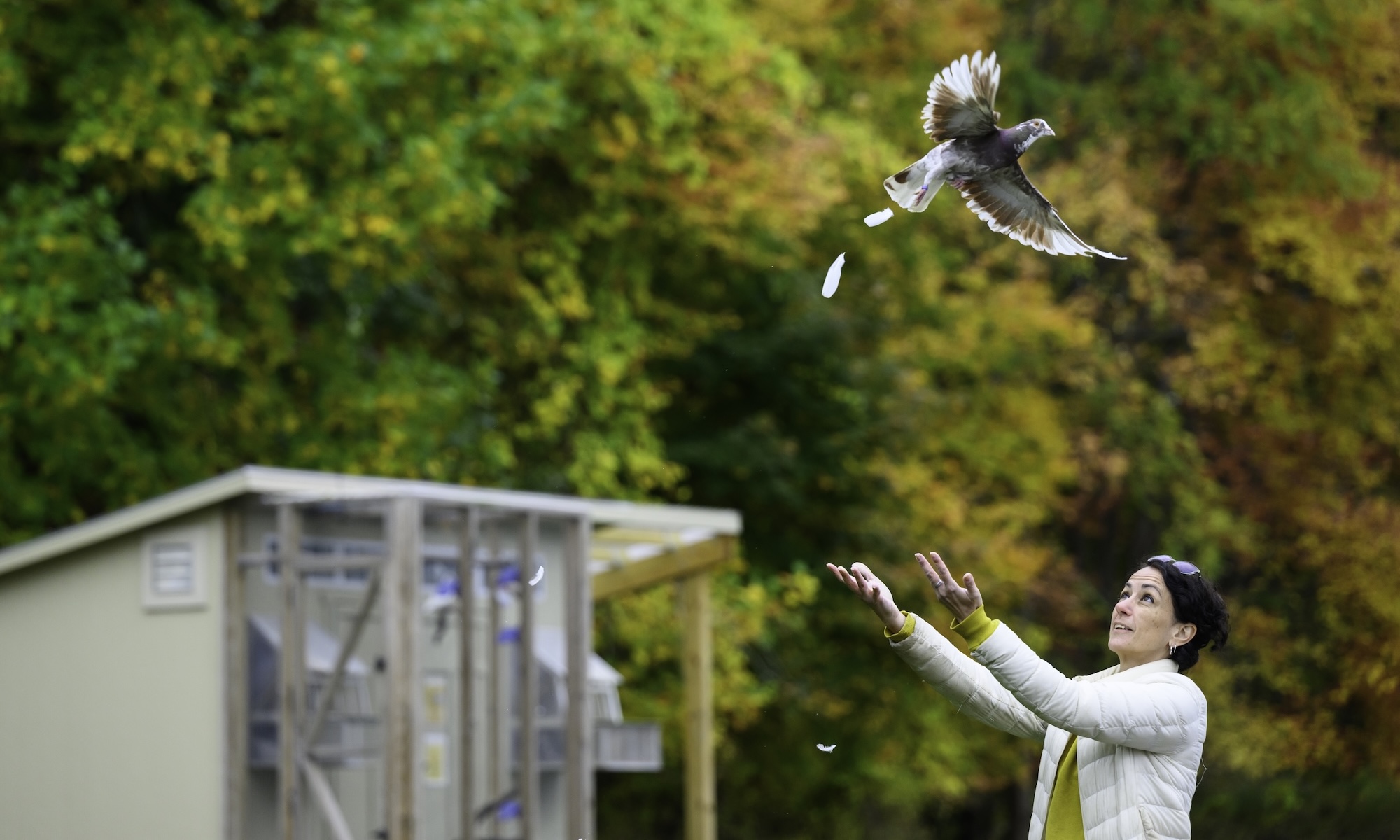The four 2017 graduates who make up the University of Rochester’s Team Meliora are within days of learning whether they will advance to the international finals in the Hult Prize—one of the world’s most prestigious social entrepreneurship competitions. Whichever team wins will receive $1 million in seed funding for their project.
Last spring, the team was eliminated in a semifinal round in San Francisco, but found themselves back in the competition after Hult Prize officials selected the team as one of three entrants in a wildcard competition. The wildcard winner—to be announced in mid-August—will join five finalist teams at the international competition on September 16 at United Nations headquarters in New York.
Team Meliora is composed of Edgar Alaniz ’17, a biochemistry and clinical psychology graduate from Mexico; Carlos (Yuki) Gonzalez ’17, a financial economics graduate from Paraguay; Ibrahim Mohammad ’17, a mechanical engineering graduate and a Palestinian refugee from Lebanon; and Omar Soufan ’17, a biomedical engineering graduate from Syria.
The Hult Prize, now in its eighth year, is funded by Swedish billionaire Bertil Hult, cofounder of EF Education First, in partnership with the Clinton Global Initiative. Former president Bill Clinton sets the challenge each year and announces the winner. The event features major business, government, and NGO leaders.
Turning trash into homes
Each year, the competition has a theme. This year’s theme, “Refugees—Reawakening Human Potential,” seeks projects to help restore the rights and dignity of people forced into motion due to political, economic, or environmental factors.
Team Meliora has responded with a plan to build homes for refugees using Lego-style bricks made from recycled plastic.
Their efforts are focused in Lebanon, where 1.6 million Syrian and Palestinian refugees live, many in extreme poverty in makeshift camps and portable tents. Only three of Lebanon’s nine landfills are operational, and two tons of trash, 15 percent of which is plastic, have piled up on the streets.
According to Team Meliora, that plastic, turned into interlocking bricks, can be used to build durable, thermal, semi-permanent houses for refugees. The houses can be assembled in a few days by people with no construction experience.
Right now, the bricks are being manufactured by Conceptos Plasticos, a Colombian startup company. Soufan and Alaniz visited Colombia earlier this summer to build a sanitation unit, and Soufan and Gonzalez returned to help build a school and a home from the plastic bricks.
But they’ve made some modifications this summer to their business plan. As part of the Hult competition, they’ve participated in an eight-week crash course in business techniques from top entrepreneurs in a summer accelerator program in Cambridge, Massachusetts.
“I could go on and on about the numerous things I’ve learned through this accelerator,” says Mohammad. “I now know how hard it is to get a business off the ground, and what that truly entails.”
A crash course in business
The course takes place at the Cambridge campus of the Hult International Business School. There the wildcard teams—from Rochester, Harvard, and the University of Southern California—join the finalists—from Rutgers, Instituto Tecnologico Autonomo de Mexico, the University of Waterloo, the University of Calgary, and York University—where they are mentored by business professors from Harvard and MIT.
Each week features a different theme, with workshops, classes, visiting entrepreneurs, investor meetings, and a “Pitch Friday,” hosted by a local corporation.
“The team has performed exceptionally well this summer,” says Michael Wohl, Rochester’s associate director for social entrepreneurship and Team Meliora’s coach. “They’ve assimilated divergent views to strengthen their business plan and risen to the occasion to perform at a world-class level. I couldn’t be happier with what they’ve achieved.”
The most anticipated event each week in Cambridge is “Pitch Friday,” when teams present their business plan in front of judges.
“We get grilled,” Soufan says. “We deliver our presentation, then there’s four minutes of questions and answers and two minutes of feedback. Then, they rank all the teams based on who presented the best viable business.”
One week, Rochester was ranked second. Another week, they were second to last. But each week, the team learns.
“Our business has changed dramatically from what we were,” Soufan says. “Meliora Homes is now a financing and construction company. Refugees can go online and pick the style of house they want. They can add features like plumbing, or solar panels, and then checkout.”
The refugees can pay for the homes or rely on crowdfunding, posting their story online and relying on donations.
A third option is a real estate investment trust.
“Investors buy a house from us for $5,000 and we give the house to a refugee family,” Soufan says. “The family pays rent to us, and we pay the investor.”
A social world for social entrepreneurs
The Hult Prize teams live together, work together, and accept guidance from the same Harvard and MIT business professors. Soufan and Mohammad live in an apartment in Cambridge with four members from other teams, as do Alaniz and Gonzalez.
“We’ve all become friends,” Soufan says. “We have get-togethers, explore Boston, talk business, and every Pitch Friday we give feedback to each other on how things went.”

It’s a social world for these social entrepreneurs, but Mohammad says Team Meliora hasn’t lost focus.
“In the end,” he says, “this is a competition.”
The panel of judges for the Hult Prize finals is not set, but former judges have included mobile communications entrepreneur Mo Ibrahim, former Australian prime minister Julia Gillard, Cisco executive chairman John Chambers, and Nobel Peace Prize winner Muhammad Yunus.
While only six teams will compete for the $1 million prize, all eight teams will be invited to New York.
“We are excited about going,” Soufan says, “but we want to be on the stage. That’s what we’ve been working for all this time.”
Team Meliora’s competition
Team Meliora is one of eight teams competing for the $1 million Hult Prize. Here’s a look at the other seven:
*Ekta (University of Southern California): Team Ekta’s product Billfold aims to provide financial security to refugees who faces challenges protecting their money.
*Dignify (Harvard University): The mobile platform links refugees to digital microwork and unlocks a $450 million job market.
Empower (York University): The solar-powered WiFi bracelet provides refugees with stable and affordable internet access, allowing them to access employment opportunities.
Epoch (University of Waterloo): The mobile platform brings refugees together through the free exchange of skills, talents, and services.
Roshni Rides (Rutgers): A solar-powered eRichshaw service acts as a public transportation system for refugee communities. The eRickshaws run on batteries charged by solar energy.
Skill2Scale (University of Calgary): Leverages gamification and a smartphone application to promote integration by teaching language and cultural skills for refugees.
U-Gas (Instituo Tecnologico Autonomo de Mexico): Ecological dry toilets and urinals will be set up in refugee camps, where outbreaks of diseases associated with poor sanitation is common.
*-Wildcard entries





